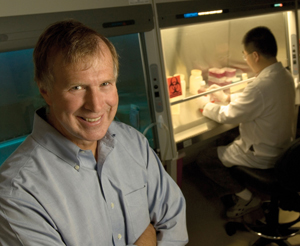June 6, 2007 - By Amy Adams
Researchers at the School of Medicine have identified the cancer stem cells that propagate tumors in colon and rectal cancer, a discovery that could lead to improved treatment of this deadly cancer.
These are the latest class of cancer stem cells tracked down by a large, interdisciplinary group of researchers led by Michael Clarke, MD. The discovery was reported in the June 4 advance online edition of the Proceedings of the National Academy of Sciences.
'This work will enable us to better understand how to identify these cells, and to do molecular studies to find potential new therapies,' said Clarke, the senior author of the paper and the Karel H. and Avice N. Beekhuis Professor in Cancer Biology.
Clarke was the first to find cancer stem cells in a solid tumor - in this case, breast cancer - in 2003 while working at the University of Michigan. Since coming to Stanford in 2005, he joined existing efforts that have resulted in finding cancer stem cells in head and neck, pancreatic and now colorectal tumors.
These stem cells act like a spring at the source of a creek, constantly dividing to produce new tumor cells. Although the other tumor cells can divide and cause damage through their sheer bulk, they are shorter lived and can't maintain the tumor's growth. The cancer stem cells are also likely to be responsible when tumors spread to distant sites.
Identifying new cancer stem cells has been a major push within Stanford's Institute for Stem Cell Biology and Regenerative Medicine, where Clarke serves as associate director. Irving Weissman, MD, director of the institute, said he hoped Stanford researchers will develop cancer therapies that specifically kill these cancer stem cells, eradicating the cancer entirely. Current therapies may kill the bulk of the tumor cells, but if any cancer stem cells remain the tumor will resurface or spread.

Michael Clarke has led an interdisciplinary group of researchers that found cancer stem cells in colorectal tumors, as well as in other tumors.
'We have brought together a team of scientists and clinicians who will help find the weak points in cancer, devise new immune and molecular diagnostics and therapeutics, test them in mice that carry the cancer stem cells and, hopefully, in a few years begin to test them in our patients,' Weissman said.
The colorectal cancer stem cells highlight the importance of a protein that is a familiar face to this group of cancer researchers. A protein called CD44 that has already been found dotting the surface of both breast and head and neck cancer stem cells also turns up on the colorectal cancer stem cells. To Piero Dalerba, MD, postdoctoral scholar and first author of the paper, that finding could simply reflect the fact that all of those tumors arise from similar tissue. It could also mean that a similar therapy could target all three cell types.
Dalerba also found a novel protein on the colorectal cancer stem cells, called CD166, that had not previously been associated with cancer stem cells. 'This is one of the major novelties of this paper,' he said. This protein could be a unique target for identifying and treating colorectal cancers.
Colon and rectal cancers are the second-most common cause of cancer-related deaths in the United States, killing more than 50,000 people each year. The tumors often go undetected until they are at a later stage and are difficult to treat. Treatment can include chemotherapy, radiation or surgery. However, Andrew Shelton, MD, assistant professor of surgery who treats colon cancer patients and participated in this study, said it's often hard to know which patients will respond best to the different treatment options.
Shelton said that grouping patients according to the treatments most likely to work for them is one possible future benefit of finding the cancer stem cells. In breast cancer, Clarke and another team of researchers recently found a group of genes that show unique patterns of being turned on or off in people who either do or don't respond well to treatment. The group hopes to do similar work with the colorectal cancer stem cells as a first step in identifying patients who may need more aggressive treatment.
Other Stanford researchers who contributed to the work include Robert Cho, MD, clinical assistant professor of pediatrics.
The work was supported by the National Institutes of Health, the Virginia and D.K. Ludwig Foundation, the California Institute for Regenerative Medicine, and the Fondazione Italiana per la Ricerca sul Cancro.
About Stanford Medicine
Stanford Medicine is an integrated academic health system comprising the Stanford School of Medicine and adult and pediatric health care delivery systems. Together, they harness the full potential of biomedicine through collaborative research, education and clinical care for patients. For more information, please visit med.stanford.edu.